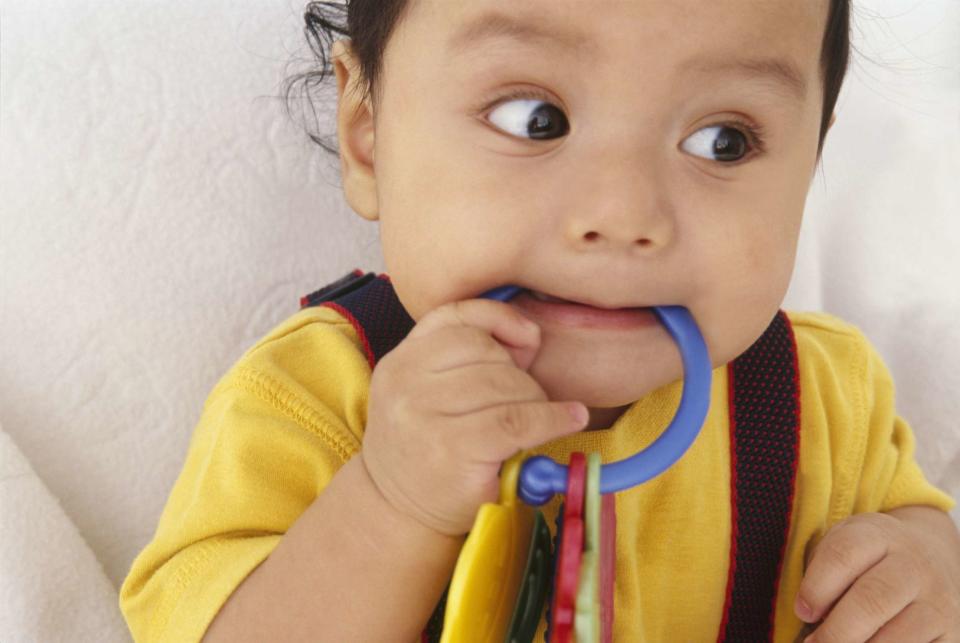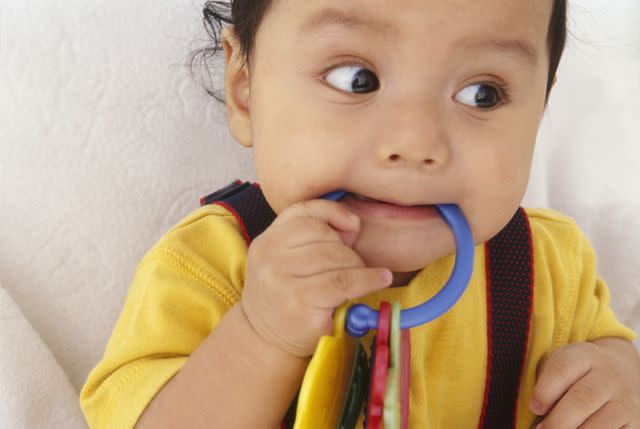A Guide to Infant Teething
Childhood Teething Shouldn't Be a Mystery

Ruth Jenkinson / Getty Images
Medically reviewed by Lyndsey Garbi, MDFact checked by Sarah Scott
The magical roller coaster of becoming a mother certainly isn't always a smooth one. After overcoming the sleepless nights, nappies, and breastfeeding, everything should get a little easier, right?

There comes a time, no matter what you do, where your little one seems to be constantly restless, in pain, or just plain miserable. Welcome to the wonderful world of teething. Teething is a critical step for your child’s development into a beautiful smiling toddler, but it’s not always the easiest stage.
As a parent, you understandably want to do everything you can to ease your baby's discomfort and ensure that his or her teeth grow big and strong. You'll go exploring the aisles for teethers, have questions about painkillers, and wonder what you can do to make your baby smile (and show off those new teeth!). Here are a few of the most common questions parents ask.
What Age Will My Baby Begin Teething?
All babies are different. Generally, the period for teething begins within 4 to 7 months of age, but that range can extend from 3 to 12 months depending on the child. Every baby is different in their timing for teething, so don’t be alarmed if your child is teething a bit early or late!
Once your baby grows their very first tooth at around 6 months of age, its time to buy baby’s first soft-bristled toothbrush and toothpaste. Make sure you choose a specially labeled infant toothpaste suitable for their age, as it will contain less fluoride than regular toothpaste.
How Will I Tell When My Baby Starts Teething?
Again, babies vary in the way they cope with teething. Some will begin silently, without you even noticing, and others will raise rooftops to let you know something is up!
Signs and symptoms may appear and disappear over several days or weeks.
Signs and Symptoms of Teething
Fussiness, irritability, and an unsettled nature
Overly disturbed sleep
Red, flushed cheeks
Drooling
Swollen gums or lips
Sucking and mouthing toys
Difficulty feeding or refusing food
Pulling on own ear (the same side as the erupting tooth)
These signs are common, but normal teething shouldn’t cause illness, so if your baby has extended fever or diarrhea during teething, consult your healthcare provider.
Related: What Is a Teething Rash?
Is Teething Painful for My Baby?
Experts aren’t sure if teething is actually painful, but whatever way you look at it, teething is an experience your baby has never had before. The sensations they are feeling in their mouths are completely new and most likely quite confusing. And as many mothers and fathers know, this is a recipe for a very irritated baby.
Related: What Is Gripe Water, and How Soon Can My Baby Take It?
In What Order Will My Baby’s Teeth Erupt?
Here is the order in which you can expect your baby’s teeth to erupt, bearing in mind that every baby is unique. Babies tend to cut their first teeth at different times and sometimes in a different order than other babies. This doesn’t mean that there is a problem, but if your child is behind this schedule, there are some conditions such as premature birth that may be preventing the eruption of teeth. Regular check-ups with your dentist will be able to detect any of these conditions.
First teeth: Lower central incisors (bottom two teeth), at around 6-10 months
Second teeth: Upper central incisors (upper two teeth), at around 8-12 months
Third teeth: Upper lateral incisors (next to the central teeth), at around 9-13 months
Fourth teeth: Lower lateral incisors (next to the central teeth), at around 10-16 months
First set of molars: Both upper and lower back teeth, at around 13-19 months
Canine teeth: Also known as the eye teeth or cuspid, at around 16-23 months
Second set of upper and lower molars, at around 23-33 months
By this time your little one will have a full set of teeth ready to chomp to their heart's content!
When Do Primary Teeth Shed?
The primary teeth don’t start to shed until about 6 to 7 years of age, so make sure you introduce good oral hygiene habits from a young age, and remember, babies and children learn more by example than words. What they see is often what they do. If you have other children, let brushing be a family activity where everyone practices good brushing technique together.
Are There Any Teething Gels That Relieve Toddler's Teething Pain?
Teething gels are not recommended for toddlers, since there's little evidence they work, and they may cause adverse side effects. The Food and Drug Administration warns not to use over-the-counter oral products containing benzocaine for infants and children younger than 2 years.
However, if you do choose to use a gel, make sure it's not only free of benzocaine but also sugar-free. Sugar is a cause of tooth decay, which can lead to cavities and even, eventually, dental restorations. You don’t want to be covering your toddler’s emerging tooth buds in sugar.
Follow the instructions on the packaging. Resist the temptation to put the gel on more often than the instructions suggest. Swallowing too much gel could be harmful. Note that mouth ulcer and general pain relief gels for adults aren’t suitable for your teething toddler.
Should I Be Breastfeeding When My Baby Is Teething?
The idea of breastfeeding during teething might seem counterintuitive. However, breast milk’s natural properties seem to be designed to ease a child’s discomfort during teething. Breastfeeding and skin to skin contact are thought to be pain-relieving during medical interventions of babies. Many babies instinctively want to nurse more during teething. Nursing also has the added benefit of helping to align baby's teeth correctly and prevent crooked teeth later, so there are multiple connections to oral health and breastfeeding.
One difficulty is dealing with the pain of a baby that bites during feeding. If your baby does bite you, your natural response is to exclaim loudly and pull them away. This will usually startle your baby, and he or she will release the nipple and react with surprise. Often, feelings will be hurt and your baby may begin to cry. This is negative reinforcement that immediately follows the behavior you want to discourage, and is often enough to keep your baby from ever biting again. Some very sensitive babies will be so upset by your reaction that they will temporarily refuse to nurse altogether.
How Can I Help My Baby Through Teething?
Unfortunately, there’s no way to speed up the teething process, so you’re left with no choice but to be patient and find ways to make the period as comfortable as possible for your little one. There are a few different techniques that can help them through periods of high irritation.
What You SHOULD NOT do if your child is teething:
Never give infants aspirin.
Never use any pain reliever or oral gel that contains a local anesthetic. These preparations are not suitable for infants under 3 months of age. Make sure to talk to your baby's healthcare provider or dentist before choosing a pain relief option.
Should I Give My Toddler Pain Killers?
This should be an absolute last resort for when your toddler is in real distress. You can give him or her a dose of infant acetaminophen or ibuprofen. These are effective painkillers and can make him or her feel more comfortable quite quickly. Always check the dosage information on the packet and always consult your practitioner or pharmacist about how much to give your child.
In addition, be sure that there isn’t something other than teething that is causing your baby to be upset. Ear infections, colds, coughs, tummy bugs, and urinary tract infections (UTIs) are often mistaken for teething. Your GP can confirm a diagnosis.
Should My Child See the Dentist?
Your child’s first dental check-up should ideally be after the first tooth appears, and no later than 12 months. Getting your baby familiar with the family dentist from the very first tooth is always beneficial. This is because they’ve had time to see that a trip to the dentist can be a safe and fun event.
Anytime you (or your other children if you have them) have an appointment, see if the dentist can have a quick fun check of your child’s teeth so that when the time comes for a proper check-up, it's not so daunting—and they’ve seen that you do it too!
Other Techniques to Help Your Child Through Teething
A few other things you can try include:
Apply light rubbing pressure to your baby’s gums. Teething babies often find it soothing to have their gums rubbed. Just gently rub your baby’s gums with the pad of your finger (clean, of course) for a few minutes at a time.
Let them bite on a cold washcloth. Teething babies love gnawing on cold items, and a chilled washcloth is an easy, safe, and effective teething toy. Place a clean, wet washcloth in the freezer for 15 minutes, and then let your baby chew it.
Use teething rings. Firm rubber teething rings and teething toys come in all kinds of shapes and sizes. They may have bumps or be filled with water—the latter are meant to be chilled in the refrigerator (most of them shouldn’t go in the freezer). For an easy homemade teething toy, squeeze water into your baby’s pacifier and chill it.
Cold food is perfect for teething babies who are already eating solid foods. Anything from frozen bananas, grapes, and bagels to cold applesauce or yogurt can do the trick. Put the food in a mesh feeder so that your baby can chew on the cold food without breaking off and swallowing large pieces.
Try teething biscuits. Some babies just don’t like cold items, but food doesn’t have to be cold to provide teething relief. Hard teething biscuits are also great for teething babies who are old enough to chew and eat them and other solid foods. Many commercial biscuits contain sugar, so you should try to make your own sugar-free teething biscuits or find products that are sugar-free.

